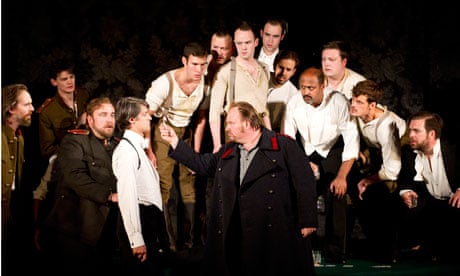Tchaikovsky's large-scale The Queen of Spades is a big ask for a small festival, but as with its previous productions of Dvořák's Rusalka and Wagner's Tristan und Isolde, Grange Park Opera shows its mettle in another late-Romantic blockbuster. For the first time they perform with the Bournemouth Symphony Orchestra in the pit, which pays serious dividends in the excitement of the music-making.
Conductor Stephen Barlow secures a broad and sharply etched interpretation that needs just a touch more consistency in its momentum to fully succeed. Given the generally high musical and dramatic aims, it's somewhat surprising to see the pastoral intermezzo in the ball scene disappear; yet the rest of the show maintains a sense of coherence.
Set in the final years of Tsarist Russia, Antony McDonald's self-designed production also comes over powerfully in the small theatre, achieving particular brilliance in the grand scenes – especially the vast opening canvas, with its phalanxes of citizens, army officers, massed nannies, governesses and groups of children, interspersed with more intimate vignettes. The characters all collide in a public space in St Petersburg, and in the climactic final gambling scene, a tour de force of focused stagecraft and finely honed acting.
The principals meet some mighty challenges head-on. Carl Tanner is physically stolid for the increasingly deranged, gambling-fixated Herman, but his mighty tenor rings out throughout to imposing and occasionally blistering effect. Anne Sophie Duprels is taken close to her vocal limits by the demands of lost soul Lisa, yet she holds firm. Anne-Marie Owens offers a fearsomely querulous Countess, Quirijn de Lang a perfectly judged Prince Yeletsky, and Roman Ialcic a super-confident Tomsky. Yet above and beyond the qualities of individual performances, it's the ongoing sense of integrated music and drama that raises the evening to distinction.

Comments (…)
Sign in or create your Guardian account to join the discussion